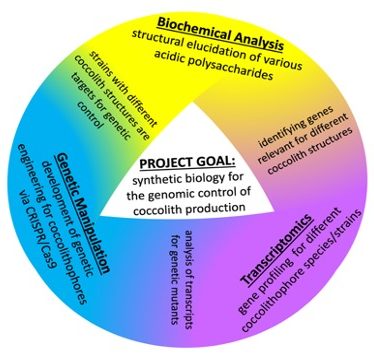
An integrated data science and experimental approach is being taken to the challenges of direct capture of CO2 from the ocean. A large group of marine microalgae, coccolithophores, produce calcium carbonate (calcite) plates referred to coccoliths. This calcification process is linked to inorganic carbon acquisition for photosynthesis and plays an important role in the global carbon cycle. Researchers on this project discovered the genetic controls of the biological calcification processes, characterized the chemical mechanisms that drive calcite formation, and, ultimately, decoupled the calcification process from photosynthetic carbon fixation. This will allow achievement of the project goal of increasing the per cell rate of calcification, thus removing more from seawater. In the long term, by understanding the in vivo process, the team will be able to reconstitute the process in a hybrid/bio inorganic system able to carry out calcification without the biological limitations thus enhancing CO2 capture.
Sandia researchers linked to work
- Todd Lane
- Wittney Mays
Sponsored by

Associated Publications
Zendejas, F., Lane, T., & Lane, P. (2011). Quantitative Laboratory Measurements of Biogeochemical Processes Controlling Biogenic Calcite Carbon Sequestration. https://doi.org/10.2172/1011227